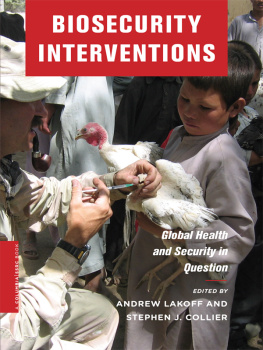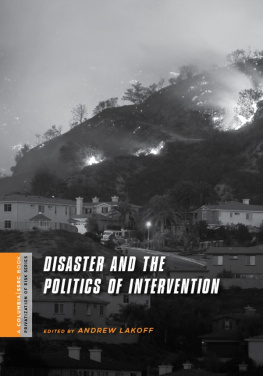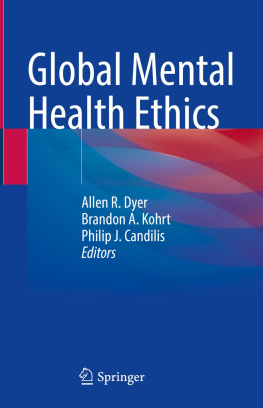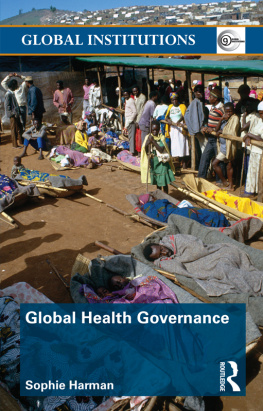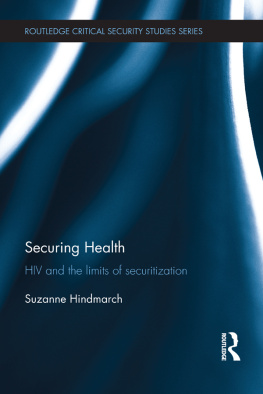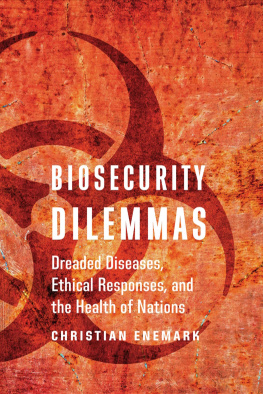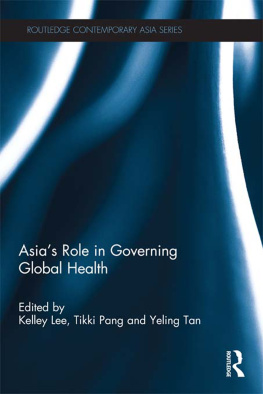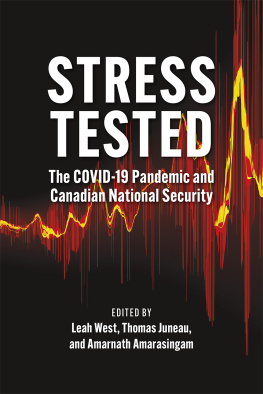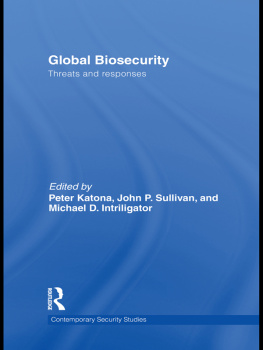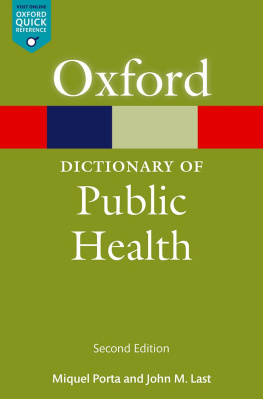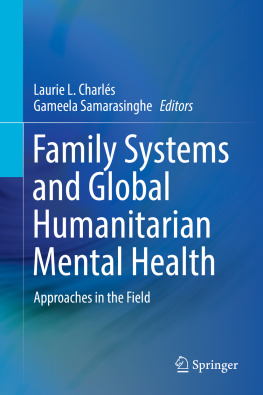BIOSECURITY INTERVENTIONS
Biosecurity Interventions
GLOBAL HEALTH & SECURITY IN QUESTION
Edited by Andrew Lakoff and Stephen J. Collier
COLUMBIA UNIVERSITY PRESSNEW YORK
A COLUMBIA / SSRC BOOK

COLUMBIA UNIVERSITY PRESS
Publishers Since 1893
New York Chichester, West Sussex
cup.columbia.edu
Copyright 2008 Columbia University Press
All rights reserved
E-ISBN 978-0-231-51177-3
Library of Congress Cataloging-in-Publication Data
Biosecurity interventions : global health and security in
practice / edited by Andrew Lakoff and Stephen J. Collier.
p. cm.
Includes bibliographical references and index.
ISBN 978-0-231-14606-7 (cloth : alk. paper)
ISBN 978-0-231-51177-3 (e-book)
1. World health. 2. Biological warfarePrevention.
3. Communicable diseasesPrevention.
4. BioterrorismPrevention. 5. National security.
I. Lakoff, Andrew, 1970 - II. Collier, Stephen J.
[DNLM: 1. World Health. 2. Bioterrorismprevention
& control. 3. Communicable Diseases, Emerging
prevention & control. 4. Disease Outbreaks
prevention & control. 5. Food Contamination
prevention & control. 6. Health Policy.
WA 530.1 B616 2008]
RA441.B56 2008
363.325'3dc22
2008020099
A Columbia University Press E-book.
CUP would be pleased to hear about your reading experience with this e-book at .
References to Internet Web sites (URLs) were accurate at the time of writing. Neither the editors nor Columbia University Press is responsible for URLs that may have expired or changed since the manuscript was prepared.
Design by Julie Fry
CONTENTS
Biosecurity Interventions
In 2007 the World Health Organization (WHO) issued its annual World Health Report, entitled A Safer Future: Global Public Health Security in the 21st Century.
The WHO report proposed a framework for responding to this new landscape of threats, which it called public health security. The framework is striking in its attempt to bring together previously distinct technical problems and political domains. Some of the biological threats discussed in the reportparticularly the use of bioweaponshave traditionally been taken up under the rubric of national security, and approached by organizations concerned with national defense. Others, such as infectious disease, have generally been managed as problems of public health, whose history, though certainly not unrelated to conflict and military affairs, has been institutionally separate.
The WHO report is one among a range of recent proposals for securing health against new or newly recognized biological threats. Other prominent examples include recent Pandemic and All-Hazards Preparedness legislation in the U.S., reports on global biological threats from think tanks such as the RAND Corporation, new research facilities such as the National Biodefense Analysis and Countermeasures Center (NBACC), and ambitious global initiatives such as the Global Fund to Fight AIDS, Tuberculosis, and Malaria, and the Presidents Emergency Plan for AIDS Relief (PEPFAR). These initiatives build on a growing perception among diverse actorslife scientists and public health officials, policymakers and security analyststhat new biological threats challenge existing ways of understanding and managing collective health and security. From the vantage point of such actors, the global scale of these threats crosses and confounds the boundaries of existing regulatory jurisdictions. Moreover, their pathogenicity and mutability pushes the limits of current technical capacities to detect and treat disease. And the diverse sources of these perceived threatsbiomedical laboratories, the industrial food system, global trade and travelsuggest a troubling growth of modernization risks that are produced by institutions meant to promote health, security, and prosperity. In response, proposals for new interventions seek to bring various actors and institutions into a common strategic framework.
The aim of this volume is to map this emerging field of biosecurity interventions. As we use the term here, biosecurity does not refer exclusivelyor even primarilyto practices and policies associated with national security, that is, to military defense against enemy attack. Rather, we refer to the various technical and political interventionsefforts to secure healththat have been formulated in response to new or newly perceived pathogenic threats. In examining these interventions, the chapters that follow do not focus on the character of health threats per se, or on the social factors that exacerbate disease risk, but rather on the forms of expertise and the knowledge practices through which disease threats are understood and managed. As such, the chapters bring into view not only the complex ecologies of pathogenicity in which threats to health have emerged, but also the ecologies of experts and organizations that are being assembled in new initiatives to link health and securitypublic health officials, policy experts, humanitarian activists, life scientists, multilateral agencies such as WHO, national health agencies such as the Centers for Disease Control (CDC), national security experts, physicians, veterinarians, and government officialsand the practices in which they are engaged. Through close examination of concrete settings in which biosecurity interventions are being articulated, these chapters show that ways of understanding and intervening in contemporary threats to health are still in formation: biosecurity does not name stable or clearly defined understandings and strategies, but rather a number of overlapping and rapidly changing problem areas.
Domains of Biosecurity
The current concern with new microbial threats has developed in at least four overlapping but distinct domains: emerging infectious disease; bioterrorism; the cutting-edge life sciences; and food safety. The first of these domains, emerging infectious disease, initially drew the attention of public health experts in the late 1980s, in response to the AIDS crisis and the appearance of drug-resistant strains of tuberculosis and malaria. After considerable delay, we have recently seen the implementation of large-scale responses to these new infectious disease threats that bring together governmental, multilateral, and philanthropic organizations.
A second area in which microbial threats have received renewed attention as a technical and political problem is in response to the prospect of bioterrorism. U.S. national security officials began to focus on this threat in the wake of the Cold War, hypothesizing an association between rogue states, global terrorist organizations and the proliferation of weapons of mass destruction.
Third, developments in the cutting-edge life sciences have generated new concerns about the proliferation of technical capacities to create lethal organisms, particularly in light of recent developments in fields like synthetic biology that promise dramatic advances in techniques of genetic manipulation. Security experts and some life scientists worry that existing biosafety protocols focused on material controls in laboratories will not be sufficient as techniques of genetic manipulation become more powerful and routine, and as expertise in molecular biology becomes increasingly widespread. A number of new biosafety regulations have been imposed on research dealing with potentially dangerous pathogens. Meanwhile, intensive discussions about how to regulate the production of knowledge are underway among policy planners, life scientists and security officials; and lawmakers have put in place new oversight mechanisms such as the National Science Advisory Board for Biosecurity (NSABB).
Fourth, and with more pronounced effects in Europe than in the United States, a series of food safety crises has sparked anxieties about agricultural biosecurity and the contamination of the food supply. In Europe, outbreaks of mad cow disease and foot-and-mouth disease in the 1990s drew attention to the side effects of industrial meat production. In the wake of these outbreaks, controversies raged both about the failures of the regulatory system in detecting new pathogens and about the mass culling measures that were mobilized in response. Also in Europe, environmental activists put the problem of regulating genetically modified food at the top of the political agenda. In the U.S., meanwhile, public outcry over food safety has been provoked by outbreaks of
Next page
